Old Testament
Genesis Exodus Leviticus Numbers Deuteronomy Joshua Judges Ruth 1 Samuel 2 Samuel 1 Kings 2 Kings 1 Chronicles 2 Chronicles Ezra Nehemiah Esther Job Psalms Proverbs Ecclesiastes Song of Solomon Isaiah Jeremiah Lamentations Ezekiel Daniel Hosea Joel Amos Obadiah Jonah Micah Nahum Habakkuk Zephaniah Haggai Zechariah MalachiZechariah 5:3
Zechariah 5:3 KJV
Then said he unto me, This is the curse that goeth forth over the face of the whole earth: for every one that stealeth shall be cut off as on this side according to it; and every one that sweareth shall be cut off as on that side according to it.
Zechariah 5:3 Bible Commentary
Commentary on Zechariah 5:3
Verse Reference: Zechariah 5:3 - “Then said he unto me, This is the curse that goeth forth over the face of the whole earth: for every one that stealeth shall be cut off as on this side according to it; and every one that sweareth shall be cut off as on that side according to it.”
Introduction
In Zechariah 5:3, we encounter a prophetic vision laden with significance for the people of Israel and, by extension, the Church. This statement serves as a divine decree accompanied by the symbol of a flying scroll—a literary device that underscores the nature of God’s judgment and the universality of His commandments. The historical and spiritual context of this passage provides ample material for theological reflection.
Textual Analysis
This verse falls within the broader framework of Zechariah’s night visions (Zechariah 1:7-6:15), which serve to illuminate God’s plans for Israel post-exile. Zechariah provides a unique prophetic perspective, offering both warnings and messages of hope, embodying God's justice and mercy.
The Symbolism of the Flying Scroll
The scroll symbolizes the Law of God, essentially representing His commandments that encompass every moral and ethical guideline His people are expected to uphold. It conveys a sense of impending judgment directed toward those who violate these laws.
Curse as a Divine Decree
The term "curse" in this context indicates a strong warning against sin—specifically theft and false oaths. Matthew Henry notes that this curse is an expression of God's displeasure with injustice and a call to repentance. The duality presented—punishment for theft on one side and punishment for swearing falsely on the other—suggests the comprehensive nature of God's justice.
Thematic Insights
Understanding the implications of Zechariah 5:3 requires exploring several key themes:
- Accountability: The verse underscores that individuals are accountable for their actions. The specificity of the sins—stealing and swearing—illustrates particular ethical breaches that provoke divine judgment.
- The Nature of Sin: Sin is positioned not merely as a personal failing but as a communal issue with far-reaching implications for society at large. Adam Clarke highlights that these sins undermine social trust and cohesion.
- God’s Justice: The imagery evoked by the flying scroll serves as a reminder that God's justice is omnipresent. Albert Barnes articulates that God's watchful eye observes the conduct of humanity, ensuring that no transgression goes unnoticed or unpunished.
- Restoration and Hope: While the passage speaks of judgment, it ultimately points to God's desire for restoration among His people. God’s judgments serve as a means to correct and realign. True repentance leads to restoration, aligning with the broader prophetic message of hope throughout Zechariah.
Theological Implications
The implications of Zechariah 5:3 extend beyond its historical context, anchoring itself into broader theological discourse:
Universal Application of God's Law
The judgment articulated in this verse affirms the universal application of God's law. All people are called to adherence, indicating that the ethical standards set forth by God are not merely reserved for Israel but serve as a moral compass for all humanity.
Judgment and Grace
In the dual message of judgment and grace, we find a profound theological truth: God desires justice, but He also yearns for mercy. The curse serves as a warning but simultaneously offers an avenue for transformation through repentance.
Christological Perspective
From a New Testament lens, this passage foreshadows the ultimate fulfillment of law through Christ, who embodies both the demanded justice and grace for humanity. As theologians reflect upon the law, it is essential to couple the righteousness of God with the redemptive work of Jesus, who covers every transgression.
Practical Applications for Pastors and Scholars
As we draw conclusions from Zechariah 5:3, several practical applications emerge that may guide both pastoral ministry and academic scholarship:
- Encouraging Ethical Living: Pastors should emphasize the call to integrity within their congregations, challenging them to uphold God's standards in a world marred by deceit and theft.
- Teaching on Divine Justice: Educators and theologians can develop curricula that explore God’s justice, integrating historical context and moral imperatives found in the Scriptures.
- Fostering a Culture of Repentance: The Church should advocate for a culture that embraces confession and repentance, recognizing these as vital components of spiritual health and restoration.
- Drawing Hope from Judgment: Scholars and pastors alike can elucidate the hope encapsulated in God’s judgments—transformative rather than merely punitive, reflecting God’s desire for a righteous community.
Conclusion
Zechariah 5:3 serves as a potent reminder of God’s holy expectations for His people and His unwavering commitment to justice. Through examining this verse, we glean insights that encourage both introspection and communal accountability, while simultaneously offering abundant hope found through repentance. Ultimately, the prophetic voice of Zechariah inspires us to strive for holiness, pursue ethical living, and rest in the mercies of our Redeemer.


